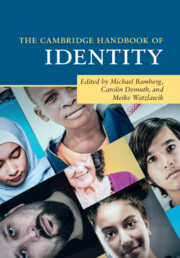Book contents
- The Cambridge Handbook of Identity
- The Cambridge Handbook of Identity
- Copyright page
- Contents
- Figures
- Tables
- Contributors
- 1 Identity: With or Without You?
- Part I The Origin and Development of the Concept of Identity
- Part II New Perspectives and Challenges
- 5 A Moral Perspective: Identity as Self-Interpretation
- 6 Researching Identities as Affective Discursive Practices
- 7 The Negotiation of Continuity and Change of Mapuche Women Weavers in Chile and Its Implications for (Non-Eurocentric) Identity Research
- 8 Identity and Voices: A Language-Dialogical Take
- 9 Psychoanalytic Perspectives on Identity: From Ego to Life Narrative
- 10 Erikson, the Identity Statuses, and Beyond
- Part III Methodological Approaches
- Part IV Current Domains
- Part V Where Is Identity?
- Author Index
- Subject Index
- References
5 - A Moral Perspective: Identity as Self-Interpretation
from Part II - New Perspectives and Challenges
Published online by Cambridge University Press: 29 October 2021
- The Cambridge Handbook of Identity
- The Cambridge Handbook of Identity
- Copyright page
- Contents
- Figures
- Tables
- Contributors
- 1 Identity: With or Without You?
- Part I The Origin and Development of the Concept of Identity
- Part II New Perspectives and Challenges
- 5 A Moral Perspective: Identity as Self-Interpretation
- 6 Researching Identities as Affective Discursive Practices
- 7 The Negotiation of Continuity and Change of Mapuche Women Weavers in Chile and Its Implications for (Non-Eurocentric) Identity Research
- 8 Identity and Voices: A Language-Dialogical Take
- 9 Psychoanalytic Perspectives on Identity: From Ego to Life Narrative
- 10 Erikson, the Identity Statuses, and Beyond
- Part III Methodological Approaches
- Part IV Current Domains
- Part V Where Is Identity?
- Author Index
- Subject Index
- References
Summary
There is a significant tradition in philosophy of conceiving of human identity in ethical terms. To have an identity is from this perspective to be committed to certain values and goods. This way of thinking goes back to the ancient Greeks, and it was rejuvenated in the twentieth century by thinkers who emphasized the “situatedness of the self” and rejuvenated the notion of virtue ethics. In this chapter, I shall articulate this tradition and show how it clashes with the ambition of much psychology and social science to be value-neutral. After tracing the historical background, I argue that Anthony Giddens’s idea of identity as self-interpretation is a useful starting point for ethical approaches to identity. Identity is here not so much a given, but rather a task of continuously interpreting oneself in light of situations and commitments. I then supplement Giddens’s approach with recent perspectives that are more explicit about the ethical. Charles Taylor’s notion of ethical sources of self and identity is drawn in to argue that human self-interpretation necessarily take place within an inescapable framework of ethical values. The virtue ethics of Alasdair MacIntyre emphasize how this takes place within evolving historical traditions, and the hermeneutic philosophy of Paul Ricœur stresses how the commitment to an identity project of “self-constancy” is a necessary condition for the realization of ethical values. Finally, I discuss how a contemporary consumer society in fragments challenges the ethical approach to identity, given the fact that ethical values are often presented as purely subjective.
- Type
- Chapter
- Information
- The Cambridge Handbook of Identity , pp. 101 - 119Publisher: Cambridge University PressPrint publication year: 2021
References
- 1
- Cited by

